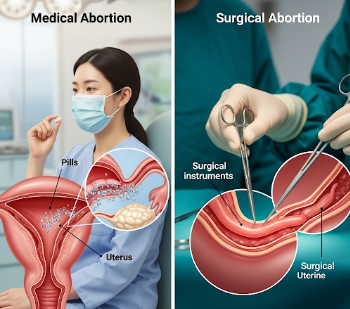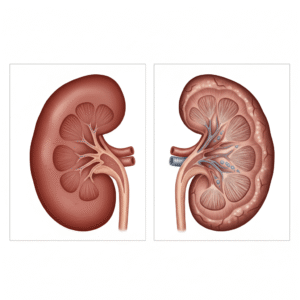Overview
Medical and Surgical Abortions are procedures used to terminate a pregnancy safely and effectively. They are offered under strict medical supervision to ensure the safety, privacy, and well-being of patients.
In Korea, abortion procedures are performed by qualified obstetricians and gynecologists in hospitals and specialized clinics, following international standards. Both medical (medication-based) and surgical options are available, depending on gestational age, health condition, and patient preference.
Highlights:
- ✅ Safe termination of early or mid-term pregnancy
- ✅ Available in both medical (medication) and surgical forms
- ✅ Minimally invasive with high success rates
- ✅ Professional care with confidentiality and counseling
What is Medical and Surgical Abortion?
Medical abortion involves the use of prescribed medications to terminate a pregnancy, typically effective up to 10 weeks of gestation.
Surgical abortion involves removal of pregnancy tissue from the uterus using a minor surgical procedure, commonly performed up to 20 weeks of gestation.
Indications include:
- Unwanted pregnancy
- Health risks to the mother
- Fetal abnormalities detected during early pregnancy
- Personal or socio-economic reasons
Important: Both procedures are safe when performed under medical supervision, and patients are counseled about the options, side effects, and follow-up care.
What are the benefits?
- Safe termination: High success rate with minimal complications
- Early intervention: Medical abortion avoids surgical risks if done early
- Short procedure and recovery time: Especially with medical abortion
- Privacy and confidentiality: Supportive care for sensitive situations
Key benefits highlighted:
- ⚡ Effective up to recommended gestational limits
- ⚡ Can be tailored to the patient’s health and preference
- ⚡ Minimal recovery time for early procedures
- ⚡ Psychological support and counseling provided
Procedure Details
1) How should I prepare for Medical or Surgical Abortion?
- Pre-procedure evaluation: Pregnancy confirmation, gestational age assessment, blood tests, and medical history review
- Medication review: Inform the doctor about allergies, chronic illnesses, or medications
- Fasting: Required for surgical abortion under anesthesia
- Consent and counseling: Discuss procedure, potential risks, expected outcomes, and follow-up
- Emotional preparation: Psychological counseling may be offered
2) What happens during the procedure?
Medical abortion:
- Medications prescribed to terminate pregnancy (commonly mifepristone followed by misoprostol)
- Patient may take medications at home under guidance
- Cramping and bleeding occur as the uterus expels pregnancy tissue
- Follow-up visit ensures completion
Surgical abortion:
- Local or general anesthesia administered
- Cervix gently dilated
- Pregnancy tissue removed using vacuum aspiration or curettage
- Procedure typically lasts 10–30 minutes
- Recovery observed briefly in the clinic or hospital
3) What happens after the procedure?
- Recovery monitoring: Observation of bleeding and vital signs
- Pain management: Analgesics prescribed for cramping or discomfort
- Activity: Gradual return to normal activities; avoid heavy lifting and sexual intercourse for 1–2 weeks
- Follow-up care: Confirm complete abortion and check for complications
Highlights for post-procedure care:
- ⚡ Mild cramping and bleeding are normal
- ⚡ Watch for signs of infection: fever, foul discharge, severe pain
- ⚡ Follow-up appointments are essential
- ⚡ Emotional support and counseling recommended
Risks / Benefits
Risks:
- Infection or incomplete abortion
- Excessive bleeding
- Rare injury to uterus or surrounding organs (surgical abortion)
- Emotional or psychological distress
Benefits:
- Safe and effective termination of pregnancy
- Minimally invasive options for early gestation
- High success rates when performed under supervision
- Access to counseling and reproductive health support
Recovery and Outlook
- Hospital stay: Usually outpatient; medical abortion done at home with follow-up
- Full recovery: 1–2 weeks; minor cramping and bleeding may persist
- Long-term outlook: Excellent; normal fertility is generally unaffected
- Follow-up: Check-up to confirm completion and provide contraceptive counseling
Tips for optimal recovery:
- ✅ Rest and avoid strenuous activity for a few days
- ✅ Maintain hygiene and monitor for infection
- ✅ Follow up with your healthcare provider
- ✅ Seek counseling if needed for emotional support
When To Call the Doctor
- Heavy or prolonged bleeding
- Severe abdominal pain not relieved by medication
- Fever, chills, or foul-smelling discharge
- Incomplete abortion or persistent pregnancy symptoms
- Any unusual or concerning symptoms
Best Korea Option / Process
Korea provides safe medical and surgical abortion services:
- Top hospitals and clinics: Specialized obstetrics and gynecology centers with experienced providers
- Comprehensive care: Counseling, pre-procedure evaluation, procedure, and follow-up
- Medical and surgical options: Choice based on gestational age, health, and patient preference
- Confidential and professional care: Ensures privacy and supportive environment
- International patient support: Online consultations, appointment scheduling, and follow-up via telemedicine
Step-by-step process in Korea:
- Consultation and medical assessment
- Selection of medical or surgical abortion based on gestational age and preference
- Procedure performed by qualified obstetricians under safe conditions
- Post-procedure observation, pain management, and follow-up care
- Counseling for emotional support and future reproductive planning













